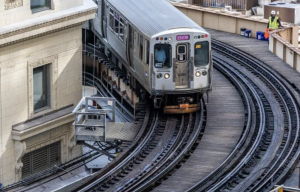Tipped wage woes
A bill in the Illinois House of Representatives could set the state’s tipped wage at the $14 minimum wage, though groups at the state level and local businesses suggest that such a change could have negative effects on prices, business profits and server wages themselves.
Per an April 4 article from Capitol News Illinois, House Bill 5345 would mandate that tipped workers be paid at least minimum wage, not including tips, rather than 60 percent of the minimum wage which is $8.40.
One of the bill’s sponsors, Rep. Elizabeth Hernandez (D-Cicero) said in early April that the bill would eliminate “subminimum wage, not tips,” adding it is intended to address any employers who do not ensure that their tipped employees are paid at least minimum wage should they not make that amount in tips.
Those in support of the bill have also addressed the difficulty workers face in trying to achieve a living wage while on a tipped wage.
That same Capitol News Illinois article also describes some of the arguments made by those against the bill, groups and individuals which include Illinois Restaurant Association President Sam Toia, Springfield Conn’s Hospitality Group President Karen Conn and several state officials and servers.
Arguments against the bill suggest it would drive up prices – particularly at restaurants – lead to business owners reducing staff to accommodate the new increased cost of labor and generally place a strain on businesses, many of which are still in the process of recovering from recession caused in part by the COVID-19 pandemic.
In downtown Waterloo, three local business owners offered their thoughts on the bill and how such a change could impact their restaurants.
Hopskeller Brewing Company’s Matthew Schweizer spoke about how tipping has been a core part of the economy for decades, serving as a way for many businesses to keep their labor costs low.
Schweizer also noted that tipped workers are still legally mandated to be paid at least minimum wage. Should the worker not make this amount in tips, the employer is required to bring their earnings up to at least $14 per hour.
“A lot of people think that tipped minimum means that if you don’t make up to minimum wage, you’re just sort of out of luck,” Schweizer said. “Every single person who is tipped minimum is currently making at least $14 an hour.”
On this topic, Schweizer also addressed the argument that some employers don’t meet this requirement.
“I understand the position of removing the tipped minimum,” Schweizer said. “I think the idea is it prevents some degree of abuse, a degree of paying people less than the minimum wage. But again, it’s really important to remember that not only is that virtually impossible if you have an accountant or payroll software – it just won’t let you. But on top of that, it’s also wildly illegal.”
He spoke to the difficulties restaurants like his have dealt with in recent years going through, as he described, a “once in a lifetime recession.”
Food and other input costs for such businesses have been hit especially hard, so employers have had to find various ways of addressing this such as implementing a credit card surcharge to somewhat soften card processing fees.
Schweizer further stressed that local businesses aren’t increasing prices for the sake of price-gouging, with profit margins for restaurants being very thin.
Regarding what the impact of HB5345 would look like for restaurants, Schweizer said there could be various outcomes as each business finds a way of lessening the blow of suddenly increased labor costs.
He suggested that businesses could raise prices significantly or make similar changes to how many people they employ or their employee hours.
Schweizer said in order to stay even with the increased payroll, he would need to cut about 70 hours per week – either closing the business for more time or limiting hours for staff.
“You’ll see more full-time jobs, but you’ll also see substantially less of them,” Schweizer said. “We kind of hover around 20-25 people staffed. If those shifts were optimized, that could be knocked down to eight. You would have more people putting in their full 35-40 hours, but you would also see a lot less people.”
He also suggested more restaurants could adopt a sort of kiosk model, removing servers and instead having customers order and then pick up their own food, though for many restaurants this could considerably affect the customer’s thoughts on their dining experience.
Jay Jones of Bean Tree Cafe spoke similarly about the bill. He particularly echoed some of Schweizer’s points regarding the goal of reducing the tipped minimum wage violations.
“I can appreciate that, but that’s illegal,” Jones said. “Isn’t that what we have the law for? That’s why there’s wage an hour laws.”
On the impact the bill’s implementation could have, Jones said Bean Tree could adapt in a number of ways, potentially implementing the previously mentioned credit card surcharge.
“It’s gonna affect us because everybody is trying to catch up with all the price increases, and we’ve already raised prices one time this year,” Jones said. “Everybody is considering, of course, going to the ‘if you use a credit card you pay more,’ you pay the fee.”
Jones further said the biggest negative impact of the bill could hit the workers that it’s meant to assist as businesses are simply forced to adapt.
“The people who are gonna lose the most probably are those people, not me,” Jones said. “Business-wise, it’s gonna be a struggle, some businesses are really gonna struggle depending on how much waitstaff they have to hold on to, and they’ll have to raise some prices. There’s no way they can just absorb it all.”
James Gallagher with both Uncle John’s RRR Bar and Gallagher’s Restaurant also offered similar sentiments about the bill.
Regarding the apparent purpose for the mandate, he suggested that a possible motive could be to address undeclared tips in the industry.
“It sounds like a solution to a problem that doesn’t exist and probably a way to decrease the tip and increase the traceable income for the government because there’s always been a hole in that,” Gallagher said. “You declare your own tips, so it seems like that would benefit the bean counters for sure, but I don’t know if it would benefit the industry.”
Gallagher said he didn’t have any particular plans ready should the mandate go into effect down the line, saying he would simply have to work with his brother and business partner, consider what others in the industry are doing and follow the trend that ultimately forms.
He noted that in the current climate with more and more people struggling financially, it wouldn’t be easy to raise prices, though it would be similarly nonviable to offer less service.
Gallagher also further stressed the existence of the current tipped minimum wage law.
“If you’re making minimum wage, and you have zero customers and you work a full shift, you get paid the full minimum wage,” Gallagher said. “You get a tip that ratchets up the difference to make sure that no matter what you always make the minimum wage, and every payroll company does that.”
With each of these business owners speaking to the negative impact the bill could have, Schweizer offered something of a summary of the situation.
“All you can hope is that, ultimately, your customers are understanding,” Schweizer said. “That there’s a little bit of understanding that you can either raise prices or lower the number of workers. Those are literally the only two options. We can’t just create money out of nowhere. None of these restaurants are just printing money.”
HB5345 is currently still in the Illinois House of Representatives with debate and amendments ongoing.






